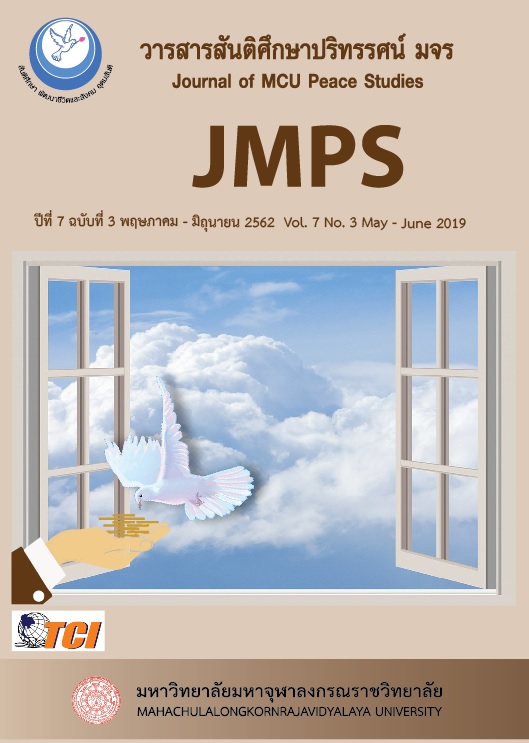การเสริมพลังความแข็งแกร่งในชีวิตของผู้สูงอายุ ในเขตระเบียงเศรษฐกิจภาคตะวันออกตามหลักพุทธธรรม
Main Article Content
บทคัดย่อ
การวิจัยครั้งนี้มีวัตถุประสงค์เพื่อสร้างแนวทางการเสริมพลังความแข็งแกร่งในชีวิตของผู้สูงอายุตาม หลักพุทธธรรม เป็นการวิจัยและพัฒนาที่ได้แนวทางจากการถอดบทเรียนประสบการณ์ผู้สูงอายุที่มีความ แข็งแกร่งในชีวิตสูง ครอบครัว และผู้นำชุมชน และตรวจสอบความเป็นไปได้ของแนวทางโดยใช้เทคนิค เดลฟาย กลุ่มตัวอย่างที่ใช้ในการศึกษาแบ่งออกเป็น 2 กลุ่ม คือ กลุ่ม 1 ผู้ให้ข้อมูลหลัก เป็นผู้สูงอายุที่มี ความแข็งแกร่งในชีวิตสูงที่ได้จากแบบสำรวจสังคมมิติ และครอบครัว ใช้วิธีการเก็บข้อมูลด้วยแนวคำถามใน การสัมภาษณ์เชิงลึก ส่วนผู้นำชุมชนที่ผู้สูงอายุอาศัยอยู่ ใช้แนวคำถามในการสนทนากลุ่มเฉพาะ และกลุ่ม 2 ผู้เชี่ยวชาญ เก็บข้อมูลโดยใช้แบบสอบถามด้วยเทคนิคเดลฟาย ประกอบด้วย กลุ่มนักวิชาการด้านผู้สูงอายุ กลุ่มผู้กำหนดนโยบายด้านผู้สูงอายุ และกลุ่มผู้สูงอายุ จำนวน 19 คน วิเคราะห์ข้อมูลโดยการวิเคราะห์ เนื้อหา ค่ามัธยฐาน และค่าพิสัยระหว่างควอไทล์ผลการวิจัยพบว่า แนวทางการเสริมพลังความแข็งแกร่งในชีวิตของผู้สูงอายุตามหลักพุทธธรรม ประกอบด้วย 3 หมวดหลัก และ 21 แนวทางหลัก 51 แนวทางย่อย คือ หมวด 1 สำหรับตัวผู้สูงอายุเอง ประกอบด้วย 6 ด้าน 15 แนวทางหลัก 33 แนวทางย่อย หมวด 2 สำหรับครอบครัว ประกอบด้วย 3 แนวทางหลัก 9 แนวทางย่อย และหมวด 3 สำหรับชุมชน ประกอบด้วย 3 แนวทางหลัก 9 แนวทางย่อย ดังนั้น ผู้สูงอายุและผู้เกี่ยวข้องควรนำแนวทางที่ได้จากงานวิจัยนี้ไปสร้างความแข็งแกร่งในชีวิตให้แก่ผู้สูงอายุ โดยเน้นให้เกิดการจัดการอารมณ์และเห็นคุณค่าตนเอง ความสามารถทางสังคม ความมั่นคงในการปฏิบัติ ทางจิตวิญญาณ การจัดการปัญหาชีวิตเชิงบวก การรับรู้ความสามารถและจุดมุ่งหมายในชีวิต และการดูแล สุขภาพกาย ซึ่งจะสามารถลดปัญหาภาวะพึ่งพา การเจ็บป่วย และค่าใช้จ่าย อันเป็นประโยชน์กับสังคมและ ประเทศชาติต่อไป
Article Details
ทัศนะและความคิดเห็นที่ปรากฏในบทความในวารสาร ถือเป็นความรับผิดชอบของผู้เขียนบทความนั้น และไม่ถือเป็นทัศนะและความรับผิดชอบของกองบรรณาธิการ ยินยอมว่าบทความเป็นลิขสิทธิ์ของวารสาร
เอกสารอ้างอิง
American Psychological Association. (2014). The road to resilience: What is resilience?. Retrieved May 31, 2015 from http://www.apa.org/helpcenter/road-resilience.aspx.
Arlete, P. F. & Anita, L. N. (2015). Resilience in ageing: literature review. Cienc Saude coletiva, 20(5), 1475-1491.
Bureau of Mental Health Promotion and Development. (2017). A trainer’s handbook for organizing 5 dimensional happiness activities for elderly in community. Bangkok: National Office of Buddhism Press.
Charoenphol, P. (2010). An Analytical Study of Buddhadhamma for the Old Aged People: A Case Study of the Old Aged People in Helping Premises in Nakhonpathom Province. Master of Art, Graduate School, Mahachulalongkornrajavidyalaya University.
Department of Mental Health. (2012). The Empowering Resilience for Local Media. Bangkok: Sankid press.
Department of Mental Health. (2006). Teacher training handbook to promote resilience to cope with the mental health crisis. Nonthaburi.
Erica, S. E., & John, H. (2015). Resilience in Ageing. Arizona Center on Ageing. The University of Arizona.
Foundation of Thai Gerontology Research and Development Institute. (2016). Situation of the Thai Elderly 2016. (1st ed.). Nakhon Pathom: Printery Co.,Ltd.
Grotberg, E. H. (2003). Resilience for today. London: Praeger.
Herrick, A. L., Lim, S. H., Wei, C., Smith, H., Guadamuz, T. E., Friedman, M. S., & Stall, R. (2011). Resilience as an untapped resource in behavioral intervention design for gay men, AIDS and Behavior, 15, S25-S29.
Hildon, Z., Montgomery, S. M., Blane, D., Wiggins, R. D., & Netuveli. (2010). Examining Resilience of Quality of Life in the Face of Health-Related and Psychosocial Adversity at Older Ages: What is “Right” About the Way We Age?, The Gerontologist, 50(1), 36-47.
Jitapunkul, S. (1999). Principles of geriatric medicine. (2nded.). Bangkok: Chulalongkorn University Press.
Lertsakornsiri, M. et al. (2017). The Comparison of Quality of Life for the Elderly under Multiple Intelligence Integration after Practice Based on Eastern Philosophy in the Thai Buddhist Style, Kuakarun Journal of Nursing, 24(1), 28-41.
Mae Chee Supharp Rakprsoot. (2017). A Study of Creating Happiness of the Elders’ Lives in the Buddhist way, Journal of MCU Social Development, 2(1), 74-85.
National Statistical Office. (2014). The 2014 Survey on Conditions of Society, Culture and Mental Health (Thai Happiness). Retrieved January 31, 2019 from http://www.nso.go.th/sites/2014/DocLib13/.
Nisaisuk, N. (2013). The Impact of Eastern Seaboard Industrial Development, Rayong: A Case Study of Mab Yangporn Community, Pluak Daeng District Rayong Province. Master of Public Administration Program, Graduate School of Public Administration, Burapha University.
Office of the National Economics and Social Development Board. (2016). East Economic Corridor Development Plan (2017-2021). Retrieved January 31, 2019, from https://www.nesdb.go.th/ewt_dl_link.php?nid=6381.
Padvee Academy. (2014). Guidelines for Application Buddhist Principles of the Elderly. Retrieved January 15, 2019 from https://www.slideshare.net/Padvee/ss-35787078. Palitnonkert, Y. et al. (2007). Mental Care Handbook in Crisis (Continue). Bangkok: Department of Mental Health.
Parayat, C. et al. (2016). Predictive Factors of Resilience among Elderly, The Journal of Faculty of Nursing Burapha University, 24(2), 97-106.
Phra Brahmagunabhorn (P.A. Payutto). (2008). Dictionary of Buddhist. (12nded.). Bangkok: MCU Press.
Phramaha Kraiwan Jinadattiyo, Phrapalad Somchai Payogo, Phramaha Surachai Jayabhivaddhano, Maechee Kulaporn Kaewwilai, Yota Chaiworamankul & Khattiya Duangsamran. (2018). The Buddhas Integration for Elder Service of Local Administration Organization in Nakhonpathom Province, Journal of Graduate Studies Review, 14(1), 83-96.
Resnick, B. A., & Inguito, P. L. (2011). The Resilience Scale: Psychometric Properties and Clinical Applicability in Older Adults, Archives of psychiatric nursing, 25(1), 11-20.
Sangsing, T. (2013). The Lifestyle of Aged People, according to Buddhist Doctrines : Case Study Ban Luekhamhan Community, Warinchamrab District, Ubonrathani Province, Graduates Development Journal, Ubon Ratchathani Rajabhat University, 2(1), 30-39.
Songchaikul C. (2018). Social Psychology. Retrieved December 1, 2018 from http://www.stou.ac.th/stoukc/elder/main1_3.html.
Southwick, S., & Wilson, P. (2015). The emerging scientific and clinical literature on resilience and psychological first aid. In N. C. Bernardy, & M. J. Friedman (Eds.), A practical guide to PTSD treatment: Pharmacological and psycho therapeutic approaches (pp.21-33). Washington, D.C. American Psychological Association.
Sutanont, T. (2013). An application of Buddhist principle for old aged people’s happy living. Master of Arts, Graduate School, Mahachulalongkornrajavidyalaya University.
Talabhat, P. & Suwankajorn, D. (2017). An Analytical Study of Positive Thinking for Life Development in Buddhist Principle, Journal of Graduate Studies Review, 13(3), 280- 291.
Thongcharoen, V. (2011). The art and science of nursing the ageing people. Bangkok: The Textbook Project of Faculty of Nursing, Mahidol University.
Vahia, I. V., Depp, C. A., Palmer, B. W., Fellows, I., Golshan, S., Thompson, W., Allison, M., & Jeste, D. V. (2011). Correlates of spirituality in older women, Aging & mental health, 15(1), 97-102.
Wagnild, G. M., & Collins, J. A. (2009). Assessing resilience, Journal of Psychosocial Nursing, 47(12), 28-33.
Wagnild, G., & Young, H. (1993). Development and psychometric evaluation of the resiliency scale, Journal of Nursing Measurement, 1, 165-178.
Watana, S. (2016). Concept of Elderly Care in Theravada Buddhism, Journal of Humanities and Social Sciences. 24(44), 173-193.
Wiles, J. L., Wild, K., Kerse, N., & Allen, R. E. S. (2012). Resilience from the point of view of older people: There still life beyond a funny knee, Social science & medicine, 74(3), 416-424.


